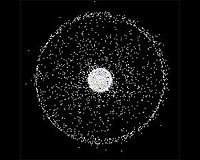 |
Tucson AZ (SPX) May 19, 2010 Astronauts are known to have a higher risk of getting sick compared to their Earth-bound peers. The stresses that go with weightlessness, confined crew quarters, being away from family and friends and a busy work schedule - all the while not getting enough sleep - are known to wreak havoc on the immune system. A research group led by immunobiologist Ty Lebsack at the University of Arizona has discovered that spaceflight changes the activity of genes controlling immune and stress response, perhaps leading to more sickness. Between spaceflight affecting a crew's susceptibility to infections and previous observations of sickness-causing microbes thriving in a near-zero gravity environment, long journeys to far-away destinations such as Mars pose a big challenge to manned space missions. "Taken together, our results hint at the possibility that an astronaut's immune system might be compromised in space," said Lebsack of the UA's department of immunobiology in the College of Medicine. Lebsack and his colleagues focused their study on the thymus gland, the organ that serves as a "factory" and "training academy" for T-cells that are key players of the immune system. They compared gene-expression patterns in thymuses from four healthy mice that had spent 13 days aboard NASA's STS-118 Endeavor Space Shuttle to those from an equal number of control mice on the ground. Their finding: 970 individual genes in the thymus of space-flown mice were up or down-regulated by a 1.5 fold change or greater. When these changes were averaged, 12 genes in the thymus tissue of all four space-flown mice were significantly up or down-regulated. "The altered genes we observed were found to primarily affect signaling molecules that play roles in programmed cell death and regulate how the body responds to stress," Lebsack said. Programmed cell death plays an important role in a functioning body, for example in the disposal of cells that are no longer needed or damaged beyond repair. However, cell death must be tightly regulated in the immune system to ensure the process does not get out of hand. "Many of the genes whose activity was down-regulated in the space-flown mice play important roles in maintaining that balance," Lebsack said. "Potentially, you could get more cell death aboard a spacecraft because of these differences." The results fit in with experiments carried out on the ground to study how microgravity affects immune cells. In these experiments, scientists mimicked weightlessness using clinostats - apparatuses that slowly rotate the study object so the Earth's gravitational pull is never perceived as coming from one consistent direction. "Previous studies with cell cultures in clinostats showed increased cell death in T-cells when you take away the gravity stimulus," said Lebsack, "so it was a logical step to test whether we find the same effects in animals exposed to an actual lack of gravity." "We observed an overall pattern about the genes whose expression was changed by space flight: All of them are involved, in one way or another, in the development, control and programmed cell death of immune cells." This study represents the first use of microarray technology to investigate gene expression in thymus tissue of space-flown mice, according to the authors. Complex research undertakings like this require specialists combining their different areas of expertise. Lebsack worked with research specialist Jose Munoz-Rodriguez at the Arizona Genomics Core Microarray Facility to compare and analyze the activity levels of thousands of genes in thymus tissue from the space-flown mice and the control group. The vast amount of data generated in this process were then processed with input from David Mount, who heads the Informatics/Bioinformatics Shared Service, and graduate student Ann Manziello, who is a co-author on the study. Both facilities are housed in the Arizona Cancer Center.
Share This Article With Planet Earth
Related Links University of Arizona Space Tourism, Space Transport and Space Exploration News
 Chaotic space traffic needs rules, less secrecy: US general
Chaotic space traffic needs rules, less secrecy: US generalWashington (AFP) May 13, 2010 A top US general on Thursday called for international rules to control chaotic space traffic, warning satellites are increasingly at risk of collision. General James Cartwright, vice chairman of the Joint Chiefs of Staff, said it was no longer possible for the United States and other countries to keep vast numbers of orbiting satellites a secret. "We're going to have get to some level of ... read more |
|
| The content herein, unless otherwise known to be public domain, are Copyright 1995-2010 - SpaceDaily. AFP and UPI Wire Stories are copyright Agence France-Presse and United Press International. ESA Portal Reports are copyright European Space Agency. All NASA sourced material is public domain. Additional copyrights may apply in whole or part to other bona fide parties. Advertising does not imply endorsement,agreement or approval of any opinions, statements or information provided by SpaceDaily on any Web page published or hosted by SpaceDaily. Privacy Statement |